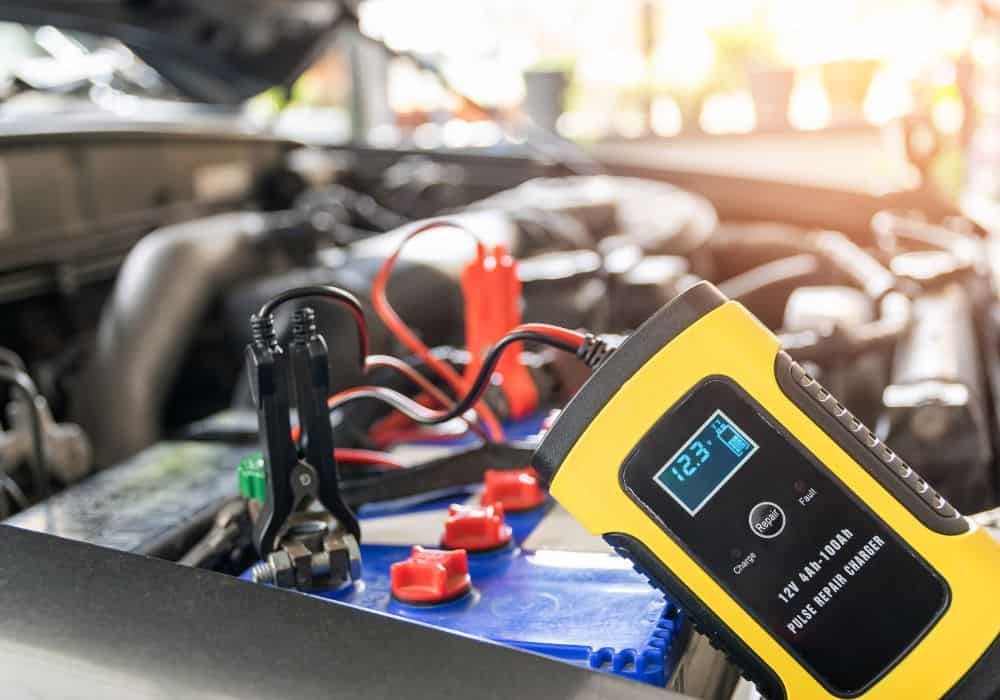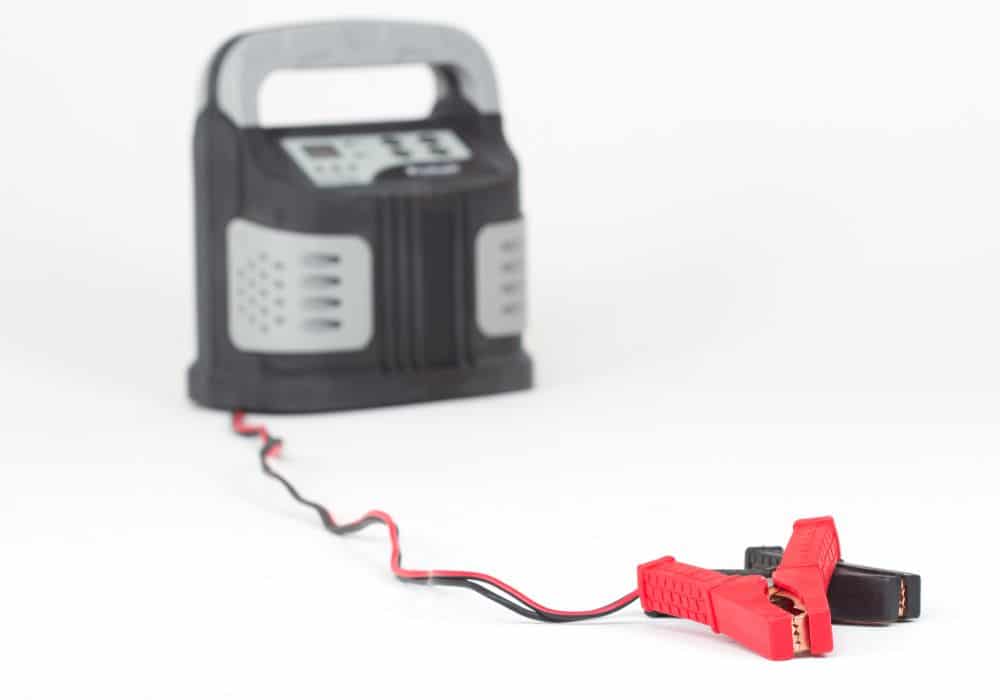If you have traveled with a bunch of devices, you probably have heard of people using an “RV converter” to charge their devices or batteries. It’s a common term that is often used interchangeably with the more-common battery charger.
However, these two things are not the same. If you are not sure whether you need an RV converter or a regular battery charger, then this article will help you find the right thing. (Hopefully, you will read this before your next major trip.)
Table of Contents
What is an RV converter?
RVs, or recreational vehicles, are large-scale vehicles that are meant to double as a “home away from home.” If you are like most people, that means that you have a lot of electrical devices that you need to power.
Typical RVs run on 120V power. Trying to power your RV’s appliances with this would fry them out, simply due to the high voltage they would be exposed to. Yet, your RV still needs that high power.
Most RV appliances run on a blend of 120V and 12V power. Knowing this, your RV has to have a way to convert that 120V into 12V from time to time. That’s where the converter comes into play. It converts and charges.
The converter is a device, often found in the power panel, that charges your RV using the shore power from a campground. Yet, it also will convert a slice of that power to 12V power, making it easier (and safer) to keep your appliances running smoothly.
There are several different styles of converters:
- Multi-stage: This converter charges everything to optimal levels, then shuts off once the job is done. This means that appliances never really charge past 80 percent capacity.
- Distribution panel: This is a converter that is found in RVs that are vintage but have been modernized. Distribution panels are fairly versatile.
- High output converters: If you have a lot of items you need to charge in an RV, a high-output converter is going to be the only way to go.
- Deck mounted converters: This is a converter that is put on your RV’s deck.
What is a battery charger?
For the sake of this article, we’re going to stick to looking at RV battery chargers rather than battery chargers as a whole. An RV battery charger is exactly what it sounds like: it charges your RV’s batteries.
There are several different types. Here’s the scoop:
- Inverted chargers: This gives you 120 volts out of a 12-volt battery when no shore power is available. They’re pretty popular in modern RVs.
- Solar chargers: This is an RV battery charger that gets its power from solar panels rather than traditional power sources.
- Traditional chargers: These are antiquated RV chargers that are meant to charge your batteries while you chill out at RV parks.
- Converter charger: If an RV battery charger uses the same converting tech that a converter does, then you can call it a converter charger. Some argue that RV converters are a subset of battery chargers: It’s a valid take if you think about it.
If you are not sure what type of charger you need, ask a professional RV salesman. They are well-schooled on everything from last year’s RV converter charger to the newest inverted chargers to hit the market.
RV converter vs battery chargers
It’s clear that both of these have their own uses that involve powering appliances. Now, let’s talk about the bigger differences between these chargers.

1. Purpose
The biggest difference between battery chargers and converters is their purpose. Both are meant to charge items, but only one is there to charge batteries and convert 120 Volts to 12 for appliances. Converters convert AC power (120 volts) to appliance-safe DC power (12V).
That’s the main difference between a charger and a converter.
Battery chargers, on the other hand, have one purpose: to charge your RV’s battery. They don’t charge appliances, at least not traditionally. As long as they charge your RV battery, they’re deemed to be perfectly functional.
It’s worth noting that converters are generally used for moments when you have your RV “hitched up” to a home or stationary power source. If you are on the road, then the battery charger might be your best bet at getting enough juice.
2. Process
Converters have a very specific process that differentiates them from traditional chargers. Their design means that they first convert the power to two different types, then the battery charges both the RV and the appliances inside.
Meanwhile, battery chargers can work with a lot of different processes. For example, an inverter charger will transform DC power into AC power. A solar charger will convert energy for the sun into RV battery energy. You get the drift.
3. Location
Both converters and battery chargers are an integral part of a motorhome’s electrical system. You don’t just need one or the other. You need both, unless you’re okay with having no refrigerators or laptop charging in your RV. (You’re not okay with this!)
The converter is typically found in the RV’s power console and will have a label that says “Converter.” Meanwhile, chargers can be found in multiple places. They can be near the converter or they could be a deck mount.
4. Pricing
It’s worth noting that there are major price ranges for both RV converters and chargers. So, while we are going to report on trends, the truth is that you will undoubtedly find a ton of exceptions to this rule.
RV converters tend to range from $200 to $600, with extremely pricey options topping $2,000. RV chargers can be pricey too, but it’s usually pretty easy to find battery chargers under $300, with some solar chargers being as affordable as $50 a pop.
PRO TIP – If you are looking for a replacement charger or converter, you can save money by going for a refurbished model. Avoid used models that have not been approved for sale by a professional, as these may be faulty.
5. Inclusion

You would be very hard-pressed to find a modern, brand new RV that didn’t have both a battery and a converter included in its build as a standard feature. However, this wasn’t always the case.
In the past, battery chargers were the only true “mandatory” part of an RV. Moreover, if you are converting a camper to an RV, then the battery might be the only part that you already have as a part of your camper that you can use in the conversion.
It’s not unusual to hear of people who are modernizing RVs by adding a new converter to the mix. This is because you need an RV power converter if you want to have an in-window air conditioner, a microwave, a fridge, or really any type of DC appliance.
People are not willing to deal with RVs that do not have creature comforts anymore. Hence, converters have become way more popular. They are now considered to be a mandatory part of RV engineering.
PRO TIP – If you are trying to update your RV or convert a camper, it may be best to talk to a professional before you shop for a converter. More often than not, they will be able to help you find a model that can handle your electronic demands at a reasonable price.
6. Durability

Durability is also a major thing to consider when you’re differentiating these two pieces of equipment. RV converters are meant to be hyper-durable. They are designed to last for the lifetime of the RV, so you shouldn’t have to replace them more than once.
RV battery chargers, on the other hand, seem to go on the fritz more often. You may have to replace some types of chargers every couple of years. It depends on the type of charger, obviously, but it’s safe to say that this is a genuine concern.
In conclusion
If you are a proud owner of a new RV, it makes sense to learn about your electrical system. Both your RV converter and your battery charger play vital roles in keeping your RV powered. The terms are often used interchangeably. Even so, they are generally not the same.
Your converter is what allows you to charge DC-powered devices in your RV while you send juice to your battery. On the other hand, the battery charger is just there to ensure that your battery gets enough charge to keep you on the road.
If you are unsure whether you need a new converter or a new battery, don’t panic. Ask a professional to take a look at your RV and guide you towards the best possible solution You will be glad you did.
